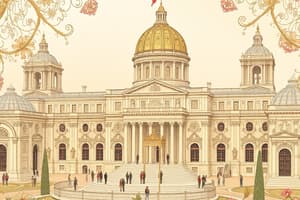Podcast
Questions and Answers
What do policy analysts teach students to break policy down into?
What do policy analysts teach students to break policy down into?
- Budgets, timelines, and stakeholders
- Historical context, international relations, and legal implications
- Goals, operationalized objectives, and specific criteria (correct)
- Case studies, theoretical frameworks, and empirical data
According to Baumgartner and Jones, which theory explicitly addresses the observation on punctuated equilibrium?
According to Baumgartner and Jones, which theory explicitly addresses the observation on punctuated equilibrium?
- Incrementalism theory
- Historical institutionalism
- Advocacy coalitions theory (correct)
- Neo-institutionalism
What concept is common in Paul Sabatier and Hank Jenkins-Smith's work on advocacy coalitions?
What concept is common in Paul Sabatier and Hank Jenkins-Smith's work on advocacy coalitions?
- Budget allocations
- Advocacy coalitions (correct)
- Policy goals
- Policy instruments
In the context of policy analysis, what are 'on-the-ground' policy requirements typically distinguished from?
In the context of policy analysis, what are 'on-the-ground' policy requirements typically distinguished from?
Which theory emphasizes both incremental and paradigmatic changes as under-specified entities?
Which theory emphasizes both incremental and paradigmatic changes as under-specified entities?
What is a key focus of applied policy analysis according to Weimer and Vining (1999)?
What is a key focus of applied policy analysis according to Weimer and Vining (1999)?
What do Michael Howlett, Paul Sabatier, and Hank Jenkins-Smith all have in common according to the text?
What do Michael Howlett, Paul Sabatier, and Hank Jenkins-Smith all have in common according to the text?
'Goals,' 'operationalized objectives,' and specific criteria are associated with breaking down which stage of policy formulation processes?
'Goals,' 'operationalized objectives,' and specific criteria are associated with breaking down which stage of policy formulation processes?
During which stage of the policy formulation process are only a subset of actors typically involved in discussing options to deal with problems?
During which stage of the policy formulation process are only a subset of actors typically involved in discussing options to deal with problems?
Who is typically involved in the policy subsystem during the formulation stage, according to the text?
Who is typically involved in the policy subsystem during the formulation stage, according to the text?
Which group of actors is involved during the decision-making stage of the policy formulation process?
Which group of actors is involved during the decision-making stage of the policy formulation process?
At what stage of the policy process is the number of actors reduced to only the authoritative government decision makers?
At what stage of the policy process is the number of actors reduced to only the authoritative government decision makers?
Who does the policy subsystem typically consist of during the implementation phase?
Who does the policy subsystem typically consist of during the implementation phase?
At which stage of the policy formulation process does the number of actors increase again, following implementation?
At which stage of the policy formulation process does the number of actors increase again, following implementation?
Who are part of the policy universe according to the text?
Who are part of the policy universe according to the text?
Which group of individuals are primarily responsible for evaluating the results of policy implementation?
Which group of individuals are primarily responsible for evaluating the results of policy implementation?
'The public policy 'hourglass' configuration of actors' mentioned in Figure 2.3 refers to which pattern?
'The public policy 'hourglass' configuration of actors' mentioned in Figure 2.3 refers to which pattern?
'Policy options to implement' are typically decided upon by which subset of actors?
'Policy options to implement' are typically decided upon by which subset of actors?




